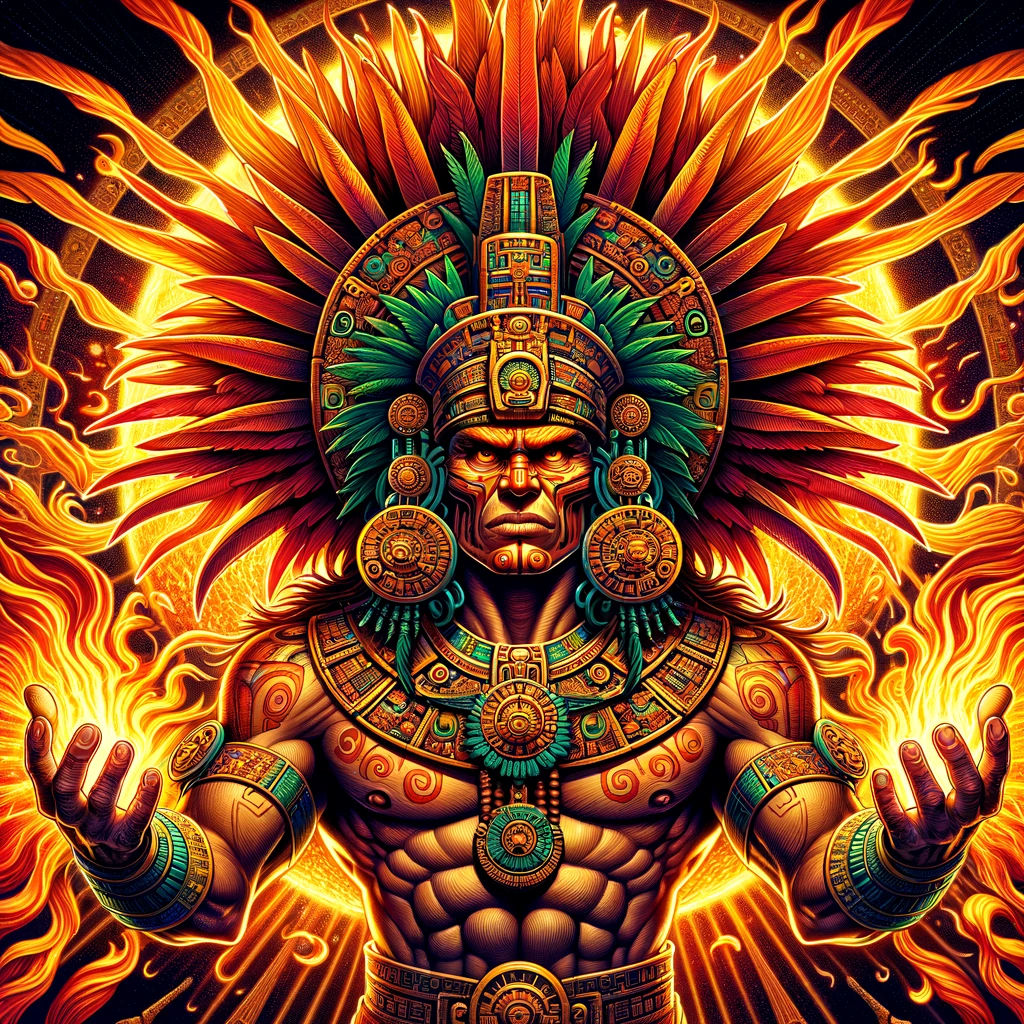
In the pantheon of Aztec mythology, Tonatiuh holds a place of extraordinary reverence and awe. Known as the Sun God, he is a deity of immense power, symbolizing the very life force that drives the universe. His name, Tonatiuh, meaning "He Who Goes Forth Shining," encapsulates his role as the provider of warmth and light, essential for the growth and sustenance of all life.
Origins and Symbolism
Tonatiuh's origins are deeply rooted in the rich tapestry of Aztec mythology. He is often depicted as a fierce warrior, with a face painted in vibrant reds and yellows, mirroring the colors of the rising and setting sun. His hair is sometimes shown as eagle feathers, a nod to the bird's status as a symbol of power and strength. The Aztecs envisioned the sun as a warrior, constantly battling the forces of darkness to rise each day. This depiction underscores their belief in the cyclical nature of life and the universe.
Role in Aztec Cosmology
In Aztec cosmology, the universe is believed to have passed through several ages, each ending in catastrophic destruction. Tonatiuh presides over the Fifth Sun, the current age, which the Aztecs believed was created through the sacrifice of gods. It is said that Tonatiuh himself required the hearts and blood of humans and gods to continue his journey across the sky, reflecting the Aztec practice of human sacrifice. This grim requirement was seen not as cruelty, but as a necessary act to maintain the balance of the universe.
The Sun Stone and the Calendar
Perhaps the most famous artifact associated with Tonatiuh is the Aztec Sun Stone, a massive stone carving often erroneously called the "Aztec Calendar." This stone, with Tonatiuh's face at its center, is actually a cosmological map, detailing the Aztec understanding of time and the universe. It highlights the central place of the Sun God in their worldview, where time and celestial events are intricately linked to divine will.
Worship and Rituals
Tonatiuh's worship was central to Aztec religious life. The Templo Mayor in Tenochtitlan, the Aztec capital, was one of the primary centers for rituals dedicated to Tonatiuh. These rituals often involved elaborate ceremonies, dances, and, most notably, human sacrifices. The Aztecs believed that these sacrifices provided Tonatiuh with the strength to battle the darkness and rise each morning.
Cultural Legacy
Tonatiuh's influence extends beyond the realm of religion. He is a symbol of the enduring power and mystery of the sun, a force that was as vital to the ancient Aztecs as it is to us today. Modern depictions of Tonatiuh continue to appear in art and literature, reflecting the lasting impact of Aztec culture and mythology on contemporary society.
Conclusion
Tonatiuh, the Aztec Sun God, is more than a deity; he is a representation of the fundamental forces that govern life and the universe. His story, interwoven with themes of sacrifice, strength, and renewal, offers a glimpse into the rich spiritual and cultural world of the Aztec people. Today, Tonatiuh stands as a testament to the enduring legacy of one of the world's great ancient civilizations.
Origins and Symbolism
Tonatiuh's origins are deeply rooted in the rich tapestry of Aztec mythology. He is often depicted as a fierce warrior, with a face painted in vibrant reds and yellows, mirroring the colors of the rising and setting sun. His hair is sometimes shown as eagle feathers, a nod to the bird's status as a symbol of power and strength. The Aztecs envisioned the sun as a warrior, constantly battling the forces of darkness to rise each day. This depiction underscores their belief in the cyclical nature of life and the universe.
Role in Aztec Cosmology
In Aztec cosmology, the universe is believed to have passed through several ages, each ending in catastrophic destruction. Tonatiuh presides over the Fifth Sun, the current age, which the Aztecs believed was created through the sacrifice of gods. It is said that Tonatiuh himself required the hearts and blood of humans and gods to continue his journey across the sky, reflecting the Aztec practice of human sacrifice. This grim requirement was seen not as cruelty, but as a necessary act to maintain the balance of the universe.
The Sun Stone and the Calendar
Perhaps the most famous artifact associated with Tonatiuh is the Aztec Sun Stone, a massive stone carving often erroneously called the "Aztec Calendar." This stone, with Tonatiuh's face at its center, is actually a cosmological map, detailing the Aztec understanding of time and the universe. It highlights the central place of the Sun God in their worldview, where time and celestial events are intricately linked to divine will.
Worship and Rituals
Tonatiuh's worship was central to Aztec religious life. The Templo Mayor in Tenochtitlan, the Aztec capital, was one of the primary centers for rituals dedicated to Tonatiuh. These rituals often involved elaborate ceremonies, dances, and, most notably, human sacrifices. The Aztecs believed that these sacrifices provided Tonatiuh with the strength to battle the darkness and rise each morning.
Cultural Legacy
Tonatiuh's influence extends beyond the realm of religion. He is a symbol of the enduring power and mystery of the sun, a force that was as vital to the ancient Aztecs as it is to us today. Modern depictions of Tonatiuh continue to appear in art and literature, reflecting the lasting impact of Aztec culture and mythology on contemporary society.
Conclusion
Tonatiuh, the Aztec Sun God, is more than a deity; he is a representation of the fundamental forces that govern life and the universe. His story, interwoven with themes of sacrifice, strength, and renewal, offers a glimpse into the rich spiritual and cultural world of the Aztec people. Today, Tonatiuh stands as a testament to the enduring legacy of one of the world's great ancient civilizations.